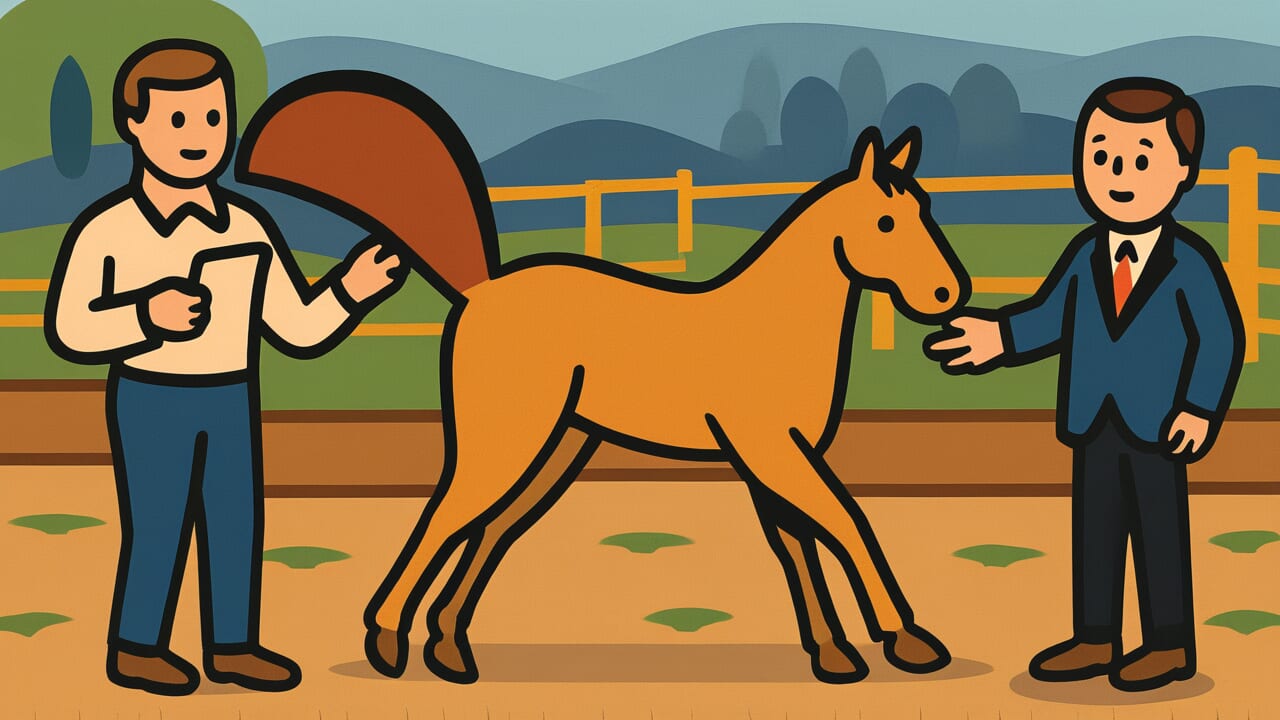How to Read “The fine horse does not meet Bole”
きばは はくらくに あわず
Meaning of “The fine horse does not meet Bole”
This proverb teaches that even if someone has outstanding talent or ability, that talent will remain buried if they don’t meet someone who can properly recognize and evaluate it.
No matter how wonderful your qualities are, their value will never be known to the world without someone who understands and draws them out.
The proverb shows how important it is to have people who discover and nurture talent, not just the efforts of talented people themselves.
People use this proverb when talented individuals find themselves in unfortunate situations or when excellent people aren’t properly evaluated.
It’s also used when teaching about the importance of having an eye for talent.
Even today, this saying deeply resonates when describing people with real ability who lack opportunities or young people who can’t find the right mentors.
Origin and Etymology
This proverb is considered an alternative writing of the more common “驥馬は伯楽に逢わず.”
The character “鴑” is sometimes used as an alternate form of “驥,” and both mean an excellent horse.
Bole was a famous horse expert who lived during China’s Spring and Autumn period.
Legend says he could tell at a glance whether a horse was a fine steed capable of running a thousand li.
Because of this, “Bole” later became synonymous with someone who can recognize outstanding talent.
A fine horse refers to a magnificent steed that can run a thousand li in a single day.
No matter how excellent a horse’s abilities, without meeting someone like Bole who understands its value, it will be treated as just an ordinary horse.
This structure beautifully expresses the relationship between talent and recognition in human society.
Behind this proverb lies the philosophy from Chinese classics: “Fine horses always exist, but Bole does not always exist.”
Even when talented people exist, those who can properly evaluate them are rare.
This saying expresses an essential truth about human society that has been recognized since ancient times.
Usage Examples
- He’s truly excellent, but the fine horse does not meet Bole—he’s completely unappreciated at his current workplace
- That young researcher’s paper is wonderful, but as they say, the fine horse does not meet Bole—it’s unfortunate that it hasn’t gained attention yet
Universal Wisdom
The truth this proverb speaks about is the deep gap that lies between talent and recognition.
In human society, having ability and having that ability recognized are completely separate matters.
Why has this teaching been passed down through the ages?
Because in every era, there have been talented people who never see the light of day, while people with the eye to recognize true value remain rare.
People can only evaluate things within the range of their own understanding.
This creates a paradox where the more excellent something is, the harder it is to understand.
This proverb contains another deep insight: the loneliness of talented people.
The pain of not having your value understood, the frustration of not being properly evaluated, and the desperate wish for someone who understands.
These are fundamental human emotions rooted in the universal psychology of the need for recognition.
At the same time, this proverb shows the weight of responsibility on the evaluator’s side.
How precious are people who can become Bole?
How difficult and important it is to have an eye for people.
Those who can discover and nurture talent are irreplaceable to society.
When AI Hears This
The problem of finding a thousand-li horse has the same structure as distinguishing a specific sound in a crowd.
In information theory’s signal detection theory, there’s always a tradeoff between “misses” and “false positives” when distinguishing true signals from noise.
If Bole judges with strict standards, he can eliminate fakes but will also miss real thousand-li horses.
Conversely, if he loosens the standards, he won’t miss thousand-li horses but will also select ordinary horses.
What’s interesting is that Bole’s rarity stems not from mere lack of experience but from the mathematical difficulty of setting detection sensitivity.
For example, if thousand-li horses appear at a rate of one in a thousand, even 99 percent accuracy produces massive false positives.
In other words, an excellent Bole is someone who intuitively understands this probability structure and has optimal judgment criteria.
Even more important is that the signal itself is context-dependent.
A thousand-li horse’s talent is buried in the noise of nutritional state and training environment.
Bole doesn’t simply look at the horse but extracts the true signal by subtracting the noise.
This equals solving a sophisticated inverse problem.
Modern AI can detect statistical patterns from vast data, but detecting unknown talent—”signals not in the training data”—remains difficult.
The essence of Bole lies in the sensitivity of sensors that detect signals beyond known patterns.
Lessons for Today
This proverb teaches modern people two important perspectives.
The first is the mindset for those with talent.
If your abilities aren’t immediately recognized, it doesn’t mean you lack talent.
You may simply not have met the right evaluator yet.
What matters is continuing to polish yourself even when you’re not being evaluated.
And actively seeking opportunities and encounters with people who will understand you.
You won’t meet Bole just by waiting.
The second is the responsibility of being an evaluator.
Among the people around you, there may be undiscovered talents.
Subordinates, colleagues, juniors, or even children.
Having the eye to recognize their potential connects to your own growth too.
People who can draw out others’ talents are precious in any era.
This teaching doesn’t preach resignation about the relationship between talent and recognition.
Rather, it teaches how important the meeting between the two is and that it’s worth making efforts toward that goal.



Comments